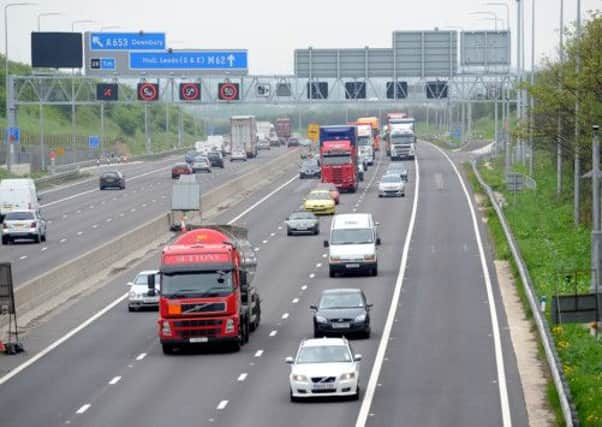Extreme difficulties of enforcing a middle of the road policy


When Minister Stephen Hammond announced a raft of new road safety measures, he knew there was one particular proposal guaranteed to get the popular vote.
Much like suggesting those whose mobile phones go off in theatres should be hauled before the nearest magistrates or calling for a cull of middle-aged presenters who still insist on wearing denim, plans to eradicate the menace of the middle-lane hogger was an easy sell.
Advertisement
Hide AdAdvertisement
Hide AdWe’ve all seen them, bumbling along at somewhere near 70mph for mile after mile, oblivious to the empty inside lane and generally getting in everyone’s way, but according to Mr Hammond not for much longer.
Rather than go through the lengthy court process, drivers caught committing offences such as tailgating and middle-lane hogging will now risk fixed penalty fines of £100 and three penalty points on their licence.
The plans also include an increase to £100 in the fine for driving without a seatbelt or using a hand-held mobile phone.
The move was widely applauded, but as ever with these announcements the devil is in the detail and a few days after the announcement the logistics of implementing the new rules are rightly being questioned.
Advertisement
Hide AdAdvertisement
Hide AdLet’s start with plans to slap a fine on every driver who either lingers too long in the middle lane of the motorway or who drives with just a cigarette paper between them and the car in front.
Everyone loves this idea, of course they do, because your average motorist has a basic grasp of the motorway rules and understands that sitting in the middle lane is frustrating, while tailgating is one of the most dangerous things you can do with a car.
However, anyone expecting a new motoring nirvana to suddenly be created is likely to be in for a big disappointment.For starters, upping the fines as a means of a deterrent seems highly marginal. Most people either do or don’t do something because of the positives or negatives, not because of the threat of punishment.
These day the vast majority of drivers choose not to drink and drive not because they fear getting a hefty fine and a ban, but because they recognise it is morally wrong and socially unacceptable.
Advertisement
Hide AdAdvertisement
Hide AdHowever, while it is similarly illegal to use a mobile phone while driving, the law is largely ignored – you only have to look at drivers in rush hour, many of whom have their phone glued to their ear or worse still, who text while driving to see how little difference the ban has made.
However, the other problem Hammond’s proposals will face and the most significant one, is a matter of resources.
Nowhere in the announcement is there any mention of increased police motorway patrols, because that’s most likely what you’ll need to dish out the fines.
As the motoring journalist Quentin Willson ably pointed out, it’s easy to outline a policy designed to win the popular vote, but without the right resources the policy is not worth the paper it’s written on.
Advertisement
Hide AdAdvertisement
Hide Ad“It’s broadly to be welcomed because it marks a shift away from remote policing – that’s cameras – to actually using traffic cops,” said the former Top Gear presenter and national spokesman for the FairFuelUK campaign.
“But the problem is the amount of traffic police cars has been cut since 1997 by 50 per cent so the obvious question is ‘how do you enforce this?’ It’s deeply faulted.”
Unfortunately, the number of motorway patrols is in steady decline because they’re more expensive than speed cameras.
Not everyone was quite so cynical. Richard Owen from the research group Road Safety Analysis said most motorists would welcome the changes, adding: “We already know that the UK’s motorways are some of the safest roads in the country, if not Europe. But of course, that relies on everybody playing their part and sticking to the rules and I think most motorists would welcome any further enforcement to make sure that people aren’t lane hogging or maybe tailgating.”
Advertisement
Hide AdAdvertisement
Hide AdI use motorways a lot, and even when I’m travelling 100 miles or more, it’s rare to see more than one motorway patrol in that entire time. I was caught speeding on the M4 last year, by a patrol rather than a camera, and I’m grateful for it; discretion, sound judgment and application of the law applied with good common sense.
The law itself is fine as it is; the problem is that the police don’t appear to have the resources to apply it properly. No size of fine can make up for that.